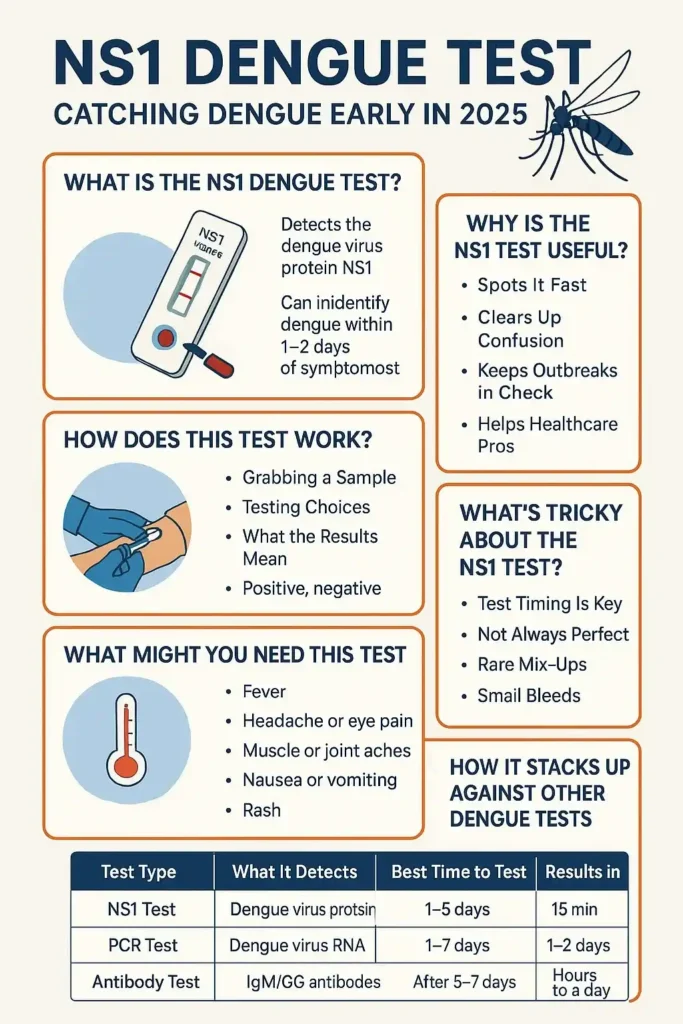
Have you ever thought about how doctors figure out dengue fever so quickly? I started wondering about this when my neighbor got sick after a trip to a tropical area, and her doctor brought up the NS1 dengue test. She had a fever that wouldn’t quit, and this test confirmed dengue just a couple of days after her symptoms started. Dengue, a mosquito-driven illness, hits millions worldwide, especially in warm, rainy regions, and spotting it early can make a huge difference in handling it. Let’s dig into what the NS1 dengue test does, how it’s done, and why it’s such a helpful tool for dealing with dengue in 2025.
What’s the NS1 Dengue Test All About?
The NS1 dengue test hunts for a protein called Non-Structural Protein 1 (NS1) that the dengue virus pumps into your blood right after infection. Unlike tests that look for antibodies—which might not show up for a week—this test can catch dengue within 1–2 days of symptoms like fever or body aches starting. It’s a speedy way to tell if dengue is what’s making you feel lousy.
How Does This Test Actually Work?
Here’s the step-by-step on how it happens:
- Grabbing a Sample: A nurse takes a tiny bit of blood, usually from your arm, in a quick pinch.
- Testing Choices: It can be checked with a detailed lab method (called ELISA) for top accuracy or a fast Rapid Diagnostic Test (RDT) that shows results in 15–30 minutes.
- What the Results Mean: If it’s positive, dengue is probably the issue; if it’s negative, you might need extra tests to be certain.
Why Does the NS1 Test Matter So Much?
- Spots It Fast: Catches dengue before your body makes antibodies, so you can act sooner.
- Clears Up Confusion: Fevers can trick you—malaria or chikungunya might seem similar—but this test pinpoints dengue.
- Keeps Outbreaks in Check: In places where dengue spreads like wildfire, quick tests help slow it down.
- Helps Healthcare Pros: Knowing early lets doctors keep a better watch on your condition.
When Might You Need This Test?
If you’re dealing with symptoms like these, it could be a sign to explore testing:
- A blazing fever (think 104°F or 40°C)
- A headache that feels like a vice grip, or eye pain
- Muscles and joints that ache like you ran a marathon
- Nausea or tossing your cookies
- A rash that shows up out of nowhere
- Small bleeds, like a nosebleed or gum bleeding
For the best accuracy, try to get tested within the first 5 days of feeling sick.
What’s Tricky About the NS1 Test?
- Test Timing Is Key: If you test too soon or after symptoms ease up, it might miss the virus.
- Not Always Perfect: Some dengue types don’t release much NS1, which can mess with the results.
- Rare Mix-Ups: It might mistake dengue for viruses like Zika in uncommon cases.
Doctors might recommend other tests, like PCR or antibody checks, to double-confirm.
How It Stacks Up Against Other Dengue Tests
| Test Type | What It Detects | Best Time to Test | Results In |
|---|---|---|---|
| NS1 Test | Dengue virus protein | 1–5 days | 15 mins (RDT) / Hours (ELISA) |
| PCR Test | Dengue virus RNA | 1–7 days | 1–2 days |
| Antibody Test | IgM/IgG antibodies | After 5–7 days | Hours to a day |
Why the NS1 Test Is a Game-Changer for Dengue
The NS1 test acts like a heads-up for dengue, letting you and your doctor tackle it early on. If you’re concerned you might have dengue, chat with a healthcare provider about testing options. Being aware of this test can be a smart move for staying on top of things in 2025!
Disclaimer: This blog post is for general informational purposes only. It is not intended as a substitute for professional medical advice, diagnosis, or treatment. Always seek the advice of your physician or other qualified health provider with any questions you may have regarding a medical condition. The author is not responsible for actions taken based on this content.